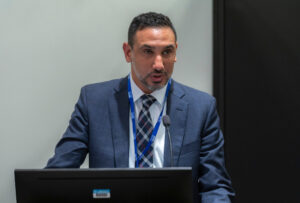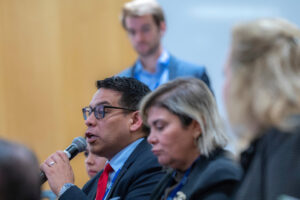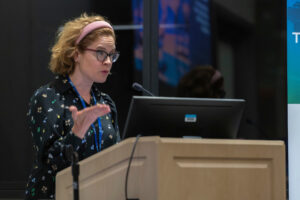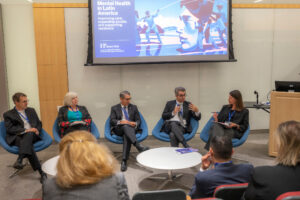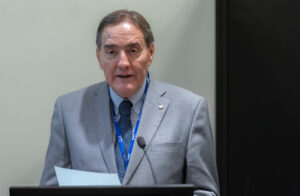Article
BCIU and Viatris Host Signature Dialogue, “Toward a Paradigm Shift of Mental Health in Latin America,” During the Seventy-Fifth WHO Regional Committee for the Americas
On Tuesday, September 26, BCIU and Viatris hosted a timely discussion in Washington, DC during the Seventy-Fifth World Health Organization (WHO) Regional Committee for the Americas to explore best practices and discuss pragmatic solutions to expanding and sustaining domestic resources for mental health. The dialogue focused on catalyzing innovation through international public and private investment, targeting funding and interventions to support at-risk groups, prioritizing life-course approach, holistic care, and investing in data, research, and education. During the program, Foreign Policy Analytics launched an issue brief on mental health in Latin America that shares case studies and assesses high-level recommendations on mental health in the region.
The program convened senior U.S. government and multilateral officials, private sector leaders, civil society, and academia with the aim of bringing clarity to which actionable steps are first needed for capacity building, resource allocation, and pharmacological and non- pharmacological intervention that can be taken by policymakers; as well as highlighting the importance of private sector involvement in catalyzing innovation, investment, and pragmatic solutions for addressing mental healthcare challenges in the region. The day after the program, the Pan American Health Organization (PAHO) approved a new regional strategy, “aimed at improving mental health and suicide prevention in the Americas and mobilizing resources to respond to the demand for care.”
Speaker Excerpts:
Dr. Jarbas Barbosa, Director, Pan American Health Organization (PAHO): “Business as usual for mental health simply will not do. We cannot maintain the status quo for mental health services which were already falling short before the pandemic. We need a fundamental shift in our approach to the issue of mental health services in the Americas.”
Dr. Nelson Arboleda, Director, Americas Office, Office of Global Affairs, U.S. Department of Health and Human Services: “There is still a need to continue to improve our messaging with the general population across the Americas. One population of focus is with migrants, as we see a lot of strain on those individuals throughout the entire immigration process. We also need to continue to work on the challenge of provide increased mental health services to our frontline health care workers who have a hard job.”
Sebastian Bauhoff, Principal Specialist, Social Protection & Health Division, Inter-American Development Bank: “We have been focused a lot on the importance of digital health tools, and there has proven a good return on investment for both in-person and remote counseling.”
Heather Schildge, Director of the Office for Regional Sustainable Development, Bureau for Latin America and the Caribbean, U.S. Agency for International Development: “USAID recognizes the importance of integrating mental health within trusted community structures through a multi sectoral approach, to promote healthy and resilient communities. We are leveraging our investments across the education, health, democracy, rights and governance, and environment sectors to expand psychosocial support, life skills, and support services for the most vulnerable populations. But above all, we must partner together as a global community to devote more resources to mental health, integrating it into all policies and across all sectors.”
Amr Ammar, Head of South Korea & LATAM Cluster, Viatris: “Open and representative dialogue around mental health priorities is key if we are to further develop sustainable access to mental health treatment in LATAM. Through such an exchange of views, public-private collaboration will enable us to map out actionable steps – from interventions to support – with the end goal of doing more for patients living with mental health disorders.”
Allison Carlson, Executive Vice President of FP Analytics, Foreign Policy: “Mental health is an inextricable and underfunded part of the NCD challenge and vital to achieving universal health coverage and integral to all Sustainable Development Goals. Untreated mental health conditions are projected to cost $6t annually by 2030 globally which is more than the costs of cancer, diabetes, and chronic respiratory diseases combined. Our recent issue brief on the topic provides a roadmap for policymakers to take to improve health outcomes across Latin America.”
Meghan Hagberg, Senior Vice President, BCIU: “Thank you to Viatris, our host the GW Environmental and Energy Management Institute, and Foreign Policy Analytics for recognizing the importance of improving mental health and suicide prevention across the Americas, and for the work that you and our expert panelists do. BCIU will continue to prioritize this topic and deliver ongoing engagements with partners like the WHO, PAHO, senior U.S. government and multilateral officials, and our corporate members in order to create positive impact.”
The event underscored the growing burden of mental health, and addressed the economic and social impacts of investing in mental health programs, highlighting that scaling up services for anxiety and depression – which costs the world $1 billion alone in lost productivity – is shown to return $4 for every $1 spent. Also highlighted was the fact that investing in parenting programs for children at risk of developing mental health conditions or in interventions for the most severe cases have even higher economic and societal returns.
